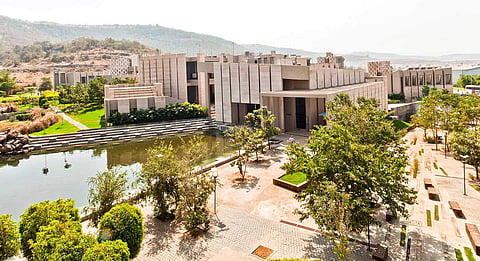

FLAME University, Pune, along with the Indian Institute of Advanced Study (IIAS), Shimla, jointly hosted a two-day virtual interdisciplinary conference on ‘New Directions in Indic Studies’ on May 12 and 13, 2021. The conference was anchored by Professor Pankaj Jain, Professor and Head, Indic Studies Initiative of FLAME University and Professor Makarand R. Paranjape, Director, Indian Institute of Advanced Study, who shared their experiences and their learnings on Indic Studies.
Multiple sessions were held on a wide range of topics, where notable speakers shared a plethora of insights, views, ideologies, methodologies, scripts, etc. dating back to the roots of the Indic civilization, foresights on the advancement in Indic studies, and so on.
Speaking about Sanskrit Buddhism, Professor Robert Thurman, Department of Religion, Columbia University said, “Karma theory as elaborated by Buddha, is to have been a kind of biological theory explaining the variety of living forms and living beings, a kind of an ancient Indian Darwin's theory, one that is for the individual, not only for the species, but for the individual, their individual life and real life, life and death and rebirth.”
Professor Lavanya Vemsani, Shawnee State University spoke about how respect for water bodies, trees and other animals is embedded in texts and lifestyles and is also represented in inscriptions, but not incorporated into history. Values that represent India must be a part of Indian history and its evolution.
While speaking about ‘Darshan’, Professor Chris Chapple, Loyola Marymount University said that to take Darshan from or with a vowed Jain monastic can be a very transfixing, transforming and transportational experience. Professor Jeffery D Long, Elizabethtown College believes that there is something we can learn from everyone, and to simply dismiss an entire world view or a belief system is mistaken, because we might be dismissing what might be valuable knowledge, this is a more non-violent approach to otherness and difference.
In another session, Professor Frederick M Smith, University of Iowa spoke about the knowledge of forests and villages in Vedic ritual and bringing together the forces of the Grama along with the forces of Aranya. The conference was very well-received and hosted notable speakers such as Professor Robert Thurman, Columbia University; Professor Deven Patel, University of Pennsylvania; Professor Frederick M. Smith, University of Iowa; Professor KTS Sarao, Delhi University; Professor Vinod Vidwans, FLAME University; Professor Bharat Gupt, IGNCA; Professor Balaganapathi Devarakonda, Delhi University; Professor Lavanya Vemsani, Shawnee State University; Professor Chris Chapple, Loyola Marymount University and Professor Jeffery D Long, Elizabethtown College.
